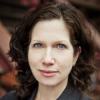Amy Waldman

Amy Waldman
Amy Waldmanis an American author and journalist. She was a reporter with the New York Times for a total of eight years. For three years she was co-chief of the South Asia bureau. Before that she covered Harlem, Brooklyn, the Bronx, and the aftermath of 9/11...
NationalityAmerican
ProfessionAuthor
CountryUnited States of America
country happened hovering totally wake
I think in the wake of 9/11, like a lot of Americans, you know, we were all very traumatized by the attacks, traumatized in a totally different way by some of what happened afterward in response. And I think there have been these questions hovering in the past decade of, what kind of country are we? Who are we?
graham jane
I'm kind of a mash-up of taste - Graham Greene and Jane Austen; W.G. Sebald and Alice Munro.
people
I wasted years worrying about what other people thought.
japan people example
History is the history of human behavior, and human behavior is the raw material of fiction. Most people recognize that novelists do research to get the facts right - how a glove factory works, for example, or how courtesans in imperial Japan dressed.
fruit pessimist brown
[s]he was a compulsive pessimist, always looking for the soft brown spot in the fruit, pressing so hard she created it.
bridges bats
Jealousy clings to love's underside like bats to a bridge.
religious emotional community
Religious speech is extreme, emotional, and motivational. It is anti-literal, relying on metaphor, allusion, and other rhetorical devices, and it assumes knowledge within a community of believers.
garden eden paradise
Eden, paradise - all the best gardens are imaginary.
children book wrestling
I read Claire Messud's 'The Emperor's Children,' I read Joseph O'Neill's 'Netherland' - but to me, they're not 9/11 novels. In 'The Emperor's Children,' 9/11 felt to me like a piece of the plot; the novel wasn't wrestling with what 9/11 meant. And 'Netherland' felt the same way. I liked both books a lot but I don't see them as 9/11 novels.
powerful coffee writing
I found 'The Twin' sitting on a coffee table at a writers' colony in 2009. It carried praise from J.M. Coetzee. That seemed ample justification for using it to avoid my own writing. I finished it - weeping - a day later, and I've been puzzling over its powerful hold on me ever since.
thinking confusion people
Fiction just has a lot more room for ambivalence and internal conflict, contradiction, and for me that sums up so much of what people felt after 9/11 - confusion even. And I think that's hard to capture in journalism.
character writing years
I had been a reporter for 15 years when I set out to write my first novel. I knew how to research an article or profile a subject - skills that I assumed would be useless when it came to fiction. It was from my imagination that the characters in my story would emerge.
reading character mean
Imagination, it turns out, is a great deal like reporting in your own head. Here is a paradox of fiction-writing. You are crafting something from nothing, which means, in one sense, that none of it is true. Yet in the writing, and perhaps in the reading, some of a character's actions or lines are truer than others.
block taken artist
In Germany, you have a huge official memorial to the murdered Jews and then you have this artist who's been putting these stumbling blocks, these brass cobblestones, outside the houses Jews were taken away from. It's somewhat controversial and has met some resistance.